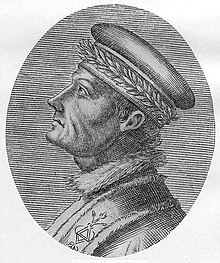Francesco Filelfo
Francesco Filelfo ( Latinized Franciscus Philelphus ; born July 25, 1398 in Tolentino near Macerata , † July 31, 1481 in Florence ) was an Italian scholar and humanist of the Renaissance .
life and work

Filelfo studied law and rhetoric in Padua . After his studies he led a restless wandering life, partly in the service of the Republic of Venice , at the court of the Duke of Milan, at the Curia in Rome, but most of the time as a professor at various Italian universities. In 1420 he accompanied the Venetian ambassador to Constantinople , where the Eastern Roman emperor occupied him with important commissions. He studied the Greek language in Constantinople. In 1423 he met the Greek emperor Johannes Palaiologos in Buda and spent several months at Sigismund's court. In February 1424 he accompanied Sigismund to the wedding of the Polish king in Cracow, where he gave humanistic speeches.
In 1427 he returned to Venice and brought a number of Greek codices with him to Italy. After teaching at the University of Bologna , he received a professorship set up by Lorenzo de 'Medici for reading Dante's Divina commedia . His position in Florence became problematic because of allegedly anti-drug interpretations of the text. In 1433 he escaped an assassination attempt, after which he left the city. Lorenzo banished him from Florence for life.
This was followed by teaching in Siena and Bologna and, mediated by the Duke of Milan, Francesco Sforza , in Padua. In 1450 he organized a festival called Sforziade for the Duke's entry into the city of Milan . In 1453 he was crowned poeta laureatus in Rome . When Alfonso Borgia became Pope Kalixt III on April 8, 1455 . When he was elected, he called Filelfo to be his secretary. As such, he also taught at the papal university. After Lorenzo had lifted the ban against him, he returned to Florence to fill the newly established chair of Greek, but died in 1481 shortly after his arrival in Florence.
Filelfo wrote poems, epigrams, letters and speeches in Latin and Italian, as well as a biography of Petrarch .
The humanist Peter Anton von Clapis († 1512), rector of Heidelberg University , was one of his students.
reception
Jacob Burckhardt ( The Culture of the Renaissance in Italy ) judged: "Most of Filelfo's orations are a hideous jumble of classical and biblical quotations, strung on a string of platitudes." Fittingly, in the current state of research, Filelfo is considered the father of the quotation mark .
Works
- Orationes et opuscula . Johann Amerbach , Basel not after 1498 ( digitized version )
expenditure
- Diana Robin (Ed.): Filelfo in Milan. Writings 1451-1477 . Princeton University Press, Princeton (NJ) 1991, ISBN 0-691-03185-1
- Diana Robin (Ed.): Francesco Filelfo: Odes. Harvard University Press, Cambridge (Massachusetts) 2009, ISBN 978-0-674-03563-8 (Latin text and English translation)
- Jeroen De Keyser, Scott Blanchard (Eds.): Francesco Filelfo: On Exile. Harvard University Press, Cambridge (Massachusetts) 2013, ISBN 978-0-674-06636-6 (Latin text and English translation of the Commentationes Florentinae de exilio )
literature
- Francesco Filelfo nel quinto centenario della morte. Atti del XVII Convegno di studi maceratesi (Tolentino, September 27-30, 1981) (= Medioevo e umanesimo 58). Antenore, Padova 1986
- Vito R. Giustiniani: Francesco Filelfo. In: Lexikon des Mittelalters , Volume 4, Artemis, Munich / Zurich 1989, Sp. 444f.
- Paolo Viti: Filelfo, Francesco. In: Fiorella Bartoccini (ed.): Dizionario Biografico degli Italiani (DBI). Volume 47: Ferrero-Filonardi. Istituto della Enciclopedia Italiana, Rome 1997.
Web links
- Short biography in the Italica project from RAI International online
- Breuiores elegantioresque Epistolae : digital version of the edition by Jan Seversz, Leiden 1509 (PDF; 8.2 MB)
| personal data | |
|---|---|
| SURNAME | Filelfo, Francesco |
| ALTERNATIVE NAMES | Philelphus, Franciscus |
| BRIEF DESCRIPTION | Italian humanist |
| DATE OF BIRTH | July 25, 1398 |
| PLACE OF BIRTH | Tolentino at Macerata |
| DATE OF DEATH | July 31, 1481 |
| Place of death | Florence |

